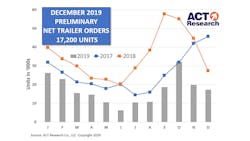After another dip in December, preliminary reports from ACT Research and FTR Intel indicate the US trailer industry booked just over 200,000 orders in 2019.
ACT pegged the total at 205,000 units, while FTR’s estimate is 203,000.
December net orders hit 17,200 trailers, according to ACT, which is a 13% decline from November volume. Activity was 37% below last December, and the 2019 total represents a 51% decline vs 2018 orders.
That annual volume was the lowest since 2011, ACT said.
Before accounting for cancellations, new orders in December were 17,900 trailers, off 16% month-over-month and 39% below last year. Full-year new orders of just over 244,000 units were down 44% vs 2018. Final volume will be available later this month, ACT said. This preliminary market estimate should be within +/- 3% of the final order tally.
“The year closed on a disappointing note, as fleets continue to maintain a very conservative stance toward 2020 capital investment,” said Frank Maly, director of commercial vehicle transportation analysis and research at ACT. “Backlog declined in 11 months of 2019, with October being the only exception to that trend. The year-end orderboard sets a very soft foundation for OEMs for the new year, as OEMs seek to better balance their production volumes to their existing orderboards.
“Preliminary information indicates that production was reduced in December, the result of both holiday schedules and a reaction to the contracting orderboard. We will watch levels in (the first quarter of 2020) closely to see if OEMs have brought their efforts into better balance.
“Inventory levels are another headwind. While inventory did decline as the year closed, the reduction in December was less than would normally be expected. That overhang will cause some further challenges to the industry during early 2020.”
FTR’s December total of 16,500 units was the lowest since August. December trailer orders were down 17% month-over-month and 41% year-over-year.
Fleets are displaying the same caution on trailers as they are showing in their Class 8 order activity, FTR maintained. The large carriers are being careful with their ordering strategy by placing smaller orders with shorter lead times than is typical at the end of a calendar year. A great deal of uncertainty exists at the start of 2020 due to a weaker manufacturing segment, the drag of tariffs and a tumultuous political situation. FTR expects buyer nervousness to increase throughout the year due to the upcoming election and conflict in the Middle East.
“Freight is forecast to grow only about 1% this year, putting little pressure on fleets to boost trailer capacity as they did the last few years,” said Don Ake, FTR vice president of commercial vehicles.
“However, total freight levels remain elevated and trailer production for 2020, although down significantly from 2018’s record year, is forecast to be good from a historical perspective. Fleets are expected to continue to replace old trailers based on their standard trade-in cycles. Van trailers sales, spurred by strong consumer spending, are still doing better than the vocational segments.
“Trailer orders should stay in the 20,000-unit-a-month range for a while, as fleets continue to carefully match orders with short-term demand. Eventually, the manufacturing sector should recover, generating more orders for flatbed and dump trailers.”
